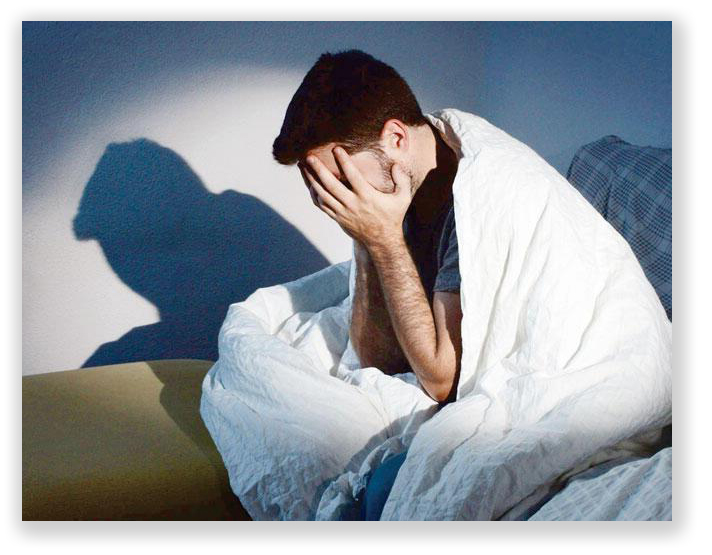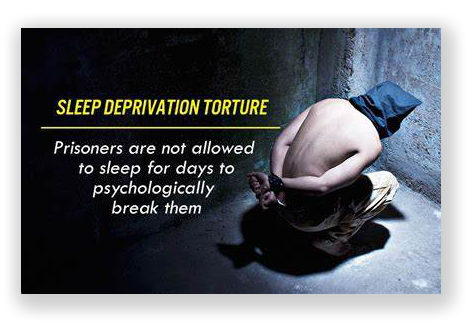We post news and comment on federal criminal justice issues, focused primarily on trial and post-conviction matters, legislative initiatives, and sentencing issues.

TO SLEEP, PERCHANCE TO DREAM
You think you have it bad…
 Mike Garrett has been in the Texas prison system for 30 years. For the last ten years, his prison units have afforded him at most 3½ hours of total sleep— and at most 2½ hours of continuous sleep per night. Bedtime is 10:30 pm and wakeup is at 2 am, with a count at 1 am during which inmates must be awake to call out their names.
Mike Garrett has been in the Texas prison system for 30 years. For the last ten years, his prison units have afforded him at most 3½ hours of total sleep— and at most 2½ hours of continuous sleep per night. Bedtime is 10:30 pm and wakeup is at 2 am, with a count at 1 am during which inmates must be awake to call out their names.
After his complaints fell on deaf ears, Mike sued, invoking the 8th Amendment’s ban on cruel and unusual punishment. The district court threw out the suit, holding that Mike didn’t prove a substantial risk of serious harm because he didn’t show a cause-and-effect relationship between the sleep deprivation and his health complaints (migraines, seizures, vertigo, a skin condition, edema, hypertension and kidney disease). Second, the district judge said Mike hadn’t established deliberate indifference by prison officials because the schedule was based on a legitimate penological interest.
There’s little doubt that sleep deprivation is hazardous to heart. Last October, Michele Deitch and Alycia Welch with the University of Texas Prison and Jail Innovation Lab gave a presentation to the International Corrections and Prisons Association on the harmful sleeping conditions in prisons, the Texas Observer reports. There, the researchers previewed findings from a forthcoming report entitled, “The Nightmare of Sleep in Prison.” Among their recommendations was an increase in dedicated sleep time. They defined a healthy amount as at least six hours nightly.
 Last week, the 5th Circuit reversed, holding that to satisfy the objective component of an 8th Amendment claim, “a prisoner need only show a substantial risk of serious harm—not actual harm. Second, the district court held that, because the Dept had “legitimate penological purposes” for implementing the schedule, and because the Department did not engage in conduct designed to intentionally inflict sleep deprivation on inmates, Garrett failed to satisfy the subjective element of his 8th Amendment claim. But the Supreme Court has clarified that a prison’s penological purpose has no bearing on whether an inmate has shown deliberate indifference for purposes of an 8th Amendment claim.”
Last week, the 5th Circuit reversed, holding that to satisfy the objective component of an 8th Amendment claim, “a prisoner need only show a substantial risk of serious harm—not actual harm. Second, the district court held that, because the Dept had “legitimate penological purposes” for implementing the schedule, and because the Department did not engage in conduct designed to intentionally inflict sleep deprivation on inmates, Garrett failed to satisfy the subjective element of his 8th Amendment claim. But the Supreme Court has clarified that a prison’s penological purpose has no bearing on whether an inmate has shown deliberate indifference for purposes of an 8th Amendment claim.”
Garrett v. Lumpkin, Case No 22-40754, 2024 U.S. App. LEXIS 6934 (5th Cir., March 22, 2024)
ABA Journal, 5th Circuit rules for prisoner allowed to sleep no more than 3.5 hours per night (March 26, 2024)
Texas Observer, Some Texas Prisoners Allowed Only Four Hours Of Sleep A Night, Lawsuit Say (April 2, 2024)
– Thomas L. Root

